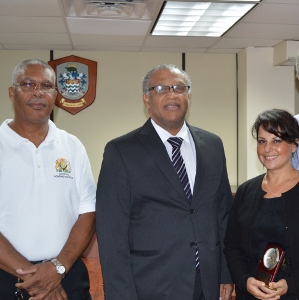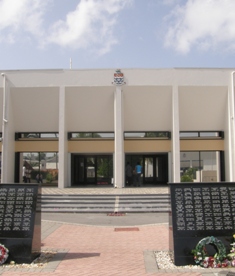Archive for January, 2014
3rd man charged in robbery
(CNS): A 35-year-old injured man was charged with robbery and possession of an unlicensed firearm Tuesday, in connection with the daylight hold-up at Diamonds International in downtown George Town on New Year’s Day. Jonathan Ramoon, who is the third man charged in the high profile case, was run over by Police Commissioner David Baines during a chase following the broad daylight jewellery store heist. Three armed men fled the scene of the crime with around half a million dollars’ worth of jewels before their escape was foiled by Baines and members of the public. Ramoon, however, was badly injured and was taken to court today by ambulance, wheeled in on a stretcher and returned to the hospital following his appearance.
Ramoon had been listed to appear in Summary Court but police did not confirm that charges had been brought until after 2pm, after the injured man’s appearance before Magistrate Valdis Foldats.
Although remanded into custody, Ramoon remains a patient at the Cayman Islands Hospital, where he is still being treated for what are understood to be serious injuries sustained after he was knocked down by the commissioner’s SUV before he and his alleged accomplices in the robbery, Christopher Myles and James McLean, were arrested.
McLean and Myles have already been charged and made their first court appearances. They are next due to appear in the Grand Court on Friday. Following his appearance today Ramoon’s case was transmitted to the Grand Court, where he will next appear on 24 January.
Since Baines was involved in the apprehension of the suspects and the resultant injuries to Ramoon, the RCIPS has confirmed that the commissioner’s involvement, the car smash and subsequent chase are part of a separate investigation.
Baines has publicly commented that the use of force by any police officer has to be necessary, justified and proportionate, whatever the context and circumstances. As a result, he said, he was assisting the investigating and would continue to do so until a decision has been made about whether or not the force he used was proportionate. The investigation is not, however, an independent enquiry but it is being carried out by officers from the RCIPS who are all under his charge.
Driver charged in road death
(CNS): The 23-year-old driver of a Mitsubishi Lancer who was involved in a high speed crash in South Sound last year that killed Zac Quappe (21) has been charged with causing death by dangerous driving. The fatal crash which took the life of the son of well-known local musicians, Chuck and Barrie Quappe, happened in the early hours of Saturday, 18 May 2013, near to Sand Cay Condos. At around 3:11am the Mitsubishi Lancer and the Ford Taurus driven by Quappe, which were both travelling southwards on the single carriageway with a 30mph speed limit, collided as the drivers were negotiating a left bend and lost control of their vehicles.
Quappe was pronounced dead at the Cayman Islands Hospital following the crash, and the unnamed driver who was treated for injuries was arrested. Police said Tuesday that he has now been charged with causing Quappe’s death and was due to appear in court on 3 February after being released on police bail.

Primary players start to secure semis spots
 (CUC-PFL): With the fourth round of the 2013/2014 CUC Primary Football League (PFL) Playoffs completed this past Saturday, several schools sealed a place in the semi finals scheduled for this Saturday, January 18. In the Under 9 Consolation Cup, Red Bay Primary defeated Truth For Youth 2-1 thanks to two goals from Alejandro Holness. Truth For Youth’s Tevin Ebanks scored the lone goal for Truth For Youth. The win ensured second place in the standings for Red Bay Primary and a semi final showdown with George Town Primary after they defeated Triple C 4-0.
(CUC-PFL): With the fourth round of the 2013/2014 CUC Primary Football League (PFL) Playoffs completed this past Saturday, several schools sealed a place in the semi finals scheduled for this Saturday, January 18. In the Under 9 Consolation Cup, Red Bay Primary defeated Truth For Youth 2-1 thanks to two goals from Alejandro Holness. Truth For Youth’s Tevin Ebanks scored the lone goal for Truth For Youth. The win ensured second place in the standings for Red Bay Primary and a semi final showdown with George Town Primary after they defeated Triple C 4-0.
The other semi final will see Truth For Youth play Bodden Town Primary.
Meanwhile, in the Under 9 Champions Cup defending champions Savannah Primary continued their dominance with a 6-0 win over South Sound Schools. The win completed a perfect playoff record for the Savannah team with four victories, no losses, scoring 15 goals in the process and conceding none.
Savannah Primary will play fourth seeded St. Ignatius Prep who grabbed a point against Cayman Prep in a 1-1 draw. Cayman Prep’s Jacob McMillan-Collet opened the scoring in the 16th minute only to see Matthew Lloyd-Hickey grab the equaliser in the 34th minute after some great individual play and a well-placed shot.
In the other semi final, third seed Sir John A. Cumber Primary will face Cayman Prep after their emphatic 4-0 victory over Prospect Primary. Goals from Rashaad Powery, Shonjae Bodden, Hakeem Seymour and a penalty by goalkeeper Diego Pino sealed the win for the boys from West Bay. The other score in the Under 9 Champions Cup saw the upstart NorthEast Schools defeat Cayman International School 1-0 thanks to a solitary strike from Randy Johnson.
In the Under 11 Consolation Cup, Red Bay Primary defeated Cayman International Schools 3-0 with goals from Tekwan Truman (2) and Cameron Bennett. The victory ensures a rematch with Cayman International School during the semi final round this Saturday as Red Bay Primary finished second in the standings and Cayman International School finished third. Truth For Youth sealed the number one seed and a meeting with Bodden Town Primary in the semis as they defeated Triple C 5-1. Elder Ebanks scored three goals in the 28th, 47th and 50th minutes after Oscar Hernandez (6thminute) and Tevin Ebanks (12th minute) opened the scoring for the boys from Truth For Youth. Triple Cs Zach Redden scored the lone goal for his school in the 7th minute.
Defending Under 11 champions Cayman Prep were in fine form this past Saturday as they eased past George Town Primary 6-0 with goals from Joshua Small (10thminute), Victor Thompson (32ndminute), Igor Magalhaes (53rd minute) and three goals from Aaron Jarvis in the 26th, 47th and 52nd minutes. Cayman Prep secured the number one seed with the victory.
Sir John A. Cumber guaranteed themselves a spot in the semi finals and the number two seed following a 3-1 victory over Prospect Primary.
In other games, Savannah Primary defeated NorthEast Schools 3-1 and St. Ignatius Prep drew 1-1 with South Sound Schools.
The third and fourth seeds have not been decided as there is a make-up game scheduled for Wednesday, January 15 with Savannah Primary taking on South Sound Schools. St. Ignatius Prep sealed their spot in the semi finals with the 1-1 draw but will need to wait until after Wednesday’s game to see if they finish third or fourth in the playoff standings. Depending on the result, either George Town Primary or South Sound Schools will secure the fourth and final spot in the semi finals.
Special thanks to Shakur Welcome and Chastine Rankine for handling the officiating duties. The semi finals of the 2013/2014 CUC PFL Playoffs are set for this Saturday, January 18 with the finals, third-place games and trophy presentation scheduled for Saturday, January 25.

Miller queries wisdom of port
 (CNS): The independent member for North Side has questioned the perceived position that the majority of people in Cayman are in favour of a cruise berthing port and that the business case has been made. Ezzard Miller said he has never been convinced that Cayman should be spending anything from $150 to $200 million on a facility for the cruise industry and noted that while this may be a private sector partnership, Cayman will be giving up the fees to cover the cost and will ultimately pick up the tab. As government seeks proposals from qualified engineering companies to do the environmental impact assessment on the proposal, Miller warns that it may not be a beneficial project for very many. (Photo Dennie Warren Jr)
(CNS): The independent member for North Side has questioned the perceived position that the majority of people in Cayman are in favour of a cruise berthing port and that the business case has been made. Ezzard Miller said he has never been convinced that Cayman should be spending anything from $150 to $200 million on a facility for the cruise industry and noted that while this may be a private sector partnership, Cayman will be giving up the fees to cover the cost and will ultimately pick up the tab. As government seeks proposals from qualified engineering companies to do the environmental impact assessment on the proposal, Miller warns that it may not be a beneficial project for very many. (Photo Dennie Warren Jr)
Disappointed that the business case had not considered alternative proposals, such as improving the tendering system and the facilities at the existing terminals, he said a dock would not necessarily benefit downtown merchants the way government has suggested and that many are hoping for. Miller suggested that assumptions that ships would stay longer was not a forgone conclusion as it was the time of arrival in the next port and the opening of the casinos that controlled cruise ship timetables.
The independent member also said that more passengers would not necessarily mean more spending. Following his own observations on busy cruise ship days, he said there may be lots of people going in and out of stores in downtown George Town but few of them return to the ship carrying many bags. The MLA pointed out that the larger ships had been developed to carry more passengers, which has cut the cost of cruising. As a result, that type of vacation is no longer the preserve of the rich and, he said, the disposable income of cruise visitors declines as the ships increase in size.
Miller said he was concerned that while the new government was at least following the spirit of the Framework for Fiscal Responsibility (FFR), the business case for the project had not been made out in a report by consultants PricewaterhouseCoopers.
"I do not believe that a proper business case has been made out for the development of cruise berthing facilities, despite Cabinet’s position,” he said. “The business case seems to have been made around a decision that was already made rather than the other way around. It did not consider any alternative proposals, such as improving the tender process or even a floating dock.”
Miller pointed to the need to improve the treatment of passengers once they arrived and said it was impossible for anyone to enjoy the visit when they are shoulder to shoulder in George Town.
“We want quality over quantity,” he said, pointing to decisions by past governments to limit the number of ships in port on any given day because of that.
Miller warned that while the cruise industry is going to press for the dock, the ships can and will still come regardless and that the government should be more cautious about the conclusion it has come to that the cruise berthing would offer any distinct advantage for the local economy to any significant degree.
He pointed to the direct risks to the environment, the potential threats to Seven Mile Beach, the strain on infrastructure of so many people disembarking at the same time and the control that the cruise lines would ultimately have were they to finance the project in the first instance, especially when there were other possibilities.
Although potential serious environmental risks have already been identified in the business case and the government is now seeking a firm to undertake the assessment, it is likely to be seeking ways to mitigate those threats rather than stop the project. Having campaigned on the issue of developing a cruise port in George Town with a private sector partner, the PPM will, having won the election, claim a mandate for the project regardless of any opposition to it or potential environmental risks.
See tender details below.

Officials warn against TV coverage of local courts
 (CNS): As the legal drafters begin the review of the contempt laws, which not only protect the principles and process of justice but also how the courts are covered in the media, officials have warned against TV coverage of local proceedings. While the drafters have said that given the consent of the judges reporters covering court should be allowed to use recorders, the idea of any type of camera in the courts has been dismissed. Pointing to high profile cases in the US that have been broadcast live, officials seeking public input have already recommended against televising the process of justice.
(CNS): As the legal drafters begin the review of the contempt laws, which not only protect the principles and process of justice but also how the courts are covered in the media, officials have warned against TV coverage of local proceedings. While the drafters have said that given the consent of the judges reporters covering court should be allowed to use recorders, the idea of any type of camera in the courts has been dismissed. Pointing to high profile cases in the US that have been broadcast live, officials seeking public input have already recommended against televising the process of justice.
“The experience in the US, from the O J Simpson trial to the Zimmermann trial, does not fill us with any enthusiasm for permitting TV cameras into the courtroom,” the drafters state in a public consultation document.
Unlike in the UK and some other jurisdictions, here in Cayman there are no statutory provisions which regulate the use of cameras, tape recorders or any other apparatus for the making of video or sound recordings of court proceedings. In the UK it is a criminal offence to take a photograph in court and the Criminal Justice Act regulates the use of tape recorders without the leave of the court by declaring it to be contempt.
However, the legal drafters point out that taking notes during proceedings is already permitted and as those with shorthand skills can take as accurate an account as an official transcript, rather than banning recording devices the courts could easily regulate them.
“We would not be disposed to recommend that sound recording devices could be introduced without the leave of the court,” they wrote in the consultation but went on to state that as far as the media is concerned, providing there is no disruption to the proceedings it was difficult to see on what basis leave could properly be refused.
While audio may be considered acceptable, photographs and video are unlikely to find their way in to the court anytime soon.
“We can see no good reason why anyone, including the media, should require this facility. There is no general rule which prevents photographs or video recordings being taken of anyone arriving at, or departing from, court and, in the case of newsworthy trials, such photographs or recordings are now common place.”
The drafters stated that a law is now needed here to introduce a specific criminal offence along the lines of the UK Criminal Justice Act to prevent pictures from being taken in the court.
Raising the question of TV cameras, the drafters said the criminal trials most likely to “excite the attention of the public” are the ones where cameras are likely “to be most objectionable”, and while cameras in the appeal court, which is now being partially covered in the UK by TV, may not be quite so objectionable, it was, they suggested, unlikely to be as attractive to broadcasters as it would not attract a sufficient number of viewers.

Simmonds claims expenses for missed vote
 (CNS): The overseas territories minister has made an expenses claim for attending the UK parliament last year, even though he missed a crucial vote which the coalition government lost. Mark Simmonds was one of ten government members that missed the vote on the British Prime Minister’s proposal to launch strikes against Syria. At the time of the vote Simmonds claimed he was in conversation with a government colleague in a room yards from the Commons chamber and did not hear the division bell. According to records released by the Independent Parliamentary Standards Authority and published by the Daily Mail, although he missed the vote Simmonds claimed £112.50 for the drive to Westminster and back from his constituency.
(CNS): The overseas territories minister has made an expenses claim for attending the UK parliament last year, even though he missed a crucial vote which the coalition government lost. Mark Simmonds was one of ten government members that missed the vote on the British Prime Minister’s proposal to launch strikes against Syria. At the time of the vote Simmonds claimed he was in conversation with a government colleague in a room yards from the Commons chamber and did not hear the division bell. According to records released by the Independent Parliamentary Standards Authority and published by the Daily Mail, although he missed the vote Simmonds claimed £112.50 for the drive to Westminster and back from his constituency.
Prime Minister David Cameron recalled Parliament on 29 August during the summer break to debate the principle of British involvement in military action in Syria after reports of war crimes by the Assad regime against his own people. While Simmonds had been embarrassed as an FCO minister by his failure to make it to the chamber, he still put in the claim for his day trip to London.

Retirement and study claims three court staff
 (CNS): The local courts have lost three key members of staff recently with the retirement of two long serving Court Marshalls and the departure of one of the judicial services court reporters. Lambert Dilbert the Chief Marshall served for 15 years and Eric Greenidge for six, though both men had already served the criminal justice system prior to becoming marshalls for several years in other capacities. Kerri Francella, has left Cayman to study in her native Canada after being here for seven years.
(CNS): The local courts have lost three key members of staff recently with the retirement of two long serving Court Marshalls and the departure of one of the judicial services court reporters. Lambert Dilbert the Chief Marshall served for 15 years and Eric Greenidge for six, though both men had already served the criminal justice system prior to becoming marshalls for several years in other capacities. Kerri Francella, has left Cayman to study in her native Canada after being here for seven years.
At a gathering to say goodbye to the three public servants the Chief justice said the courts will miss them all. “Warmest congratulations on jobs well done, and, in the case of Mr. Dilbert and Mr. Greenidge, on your hard-earned retirements,” Anthony Smellie told them.
Speaking about Francella, the top judge noted the importance of the court reporters job.
“Like the other members of the Court Reporting team, she is a true professional and very accomplished at what she does,” the Chief Justice said. “Real time court reporting is a very demanding job and a skill that takes many years of honing to acquire.”
Prior to her post as the courts, Francella served as a Hansard Officer at the Legislative Assembly for about two years.
Meanwhile, Dilbert (known as Wellington) who retired after fifteen years at the court served for ten years as a prison officer at HMP Northward before becoming a Marshall.
“It was a mark of the trust and respect that Wellington has earned that he was appointed Chief Marshall three years ago, despite other candidates vying for that position,” the Chief Justice said. “He appreciates the important duties that the Marshalls have in assisting with the orderly and efficient administration of the courts and took his responsibilities very seriously.”
Dilbert said that he has had no regrets and before coming to Cayman Dilbert worked as an artist, producing sculptures. “I did that for twelve years before coming here, so the art field holds some possibilities for me,” he said. The proud author of a collection of some 70 poems, he hopes to continue his hobby of writing poetry.
Greenidge, (who was unable to make the farewell gathering ) retired from service as a Court Marshall after six years but came to the Courts from the Royal Cayman Islands Police Service, where he rose to the position of Inspector in a career that began in the 1970s. He joined the Courts in 2003 following his retirement from the RCIPS, where he was, the Chief Justice said, “a stalwart member” of the police cricket team.
At the Courts, his performance was equally impressive. “During his years at the Courts, Mr. Greenidge also earned the trust and respect of all of us, judges and court staff alike,” the Chief Justice said. “The dignified way in which he carries himself and the disciplined and courteous manner in which he goes about his duties can serve as a good example to all who follow him in the position as Marshall. We thank him for his more than 40 years’ service to the people of these islands,” he added.

BoR and online media drive review of contempt law
 (CNS): The growth of electronic media and the introduction of the Bill of Rights have triggered a review of Cayman’s contempt laws that deal with everything from scandalizing the court to how the press covers legal proceedings. Government’s legal drafters are asking the public to contribute to the review, which aims to modernise the legislation that covers a wide range of subjects, from the rules governing jurors and witnesses to public comment about trials and judges. The Law Reform Commission has published a consultation paper and points to the need to balance freedom of expression with a fair trialand the impact of an instantaneous social media, such as Facebook, as well as the on-line press.
(CNS): The growth of electronic media and the introduction of the Bill of Rights have triggered a review of Cayman’s contempt laws that deal with everything from scandalizing the court to how the press covers legal proceedings. Government’s legal drafters are asking the public to contribute to the review, which aims to modernise the legislation that covers a wide range of subjects, from the rules governing jurors and witnesses to public comment about trials and judges. The Law Reform Commission has published a consultation paper and points to the need to balance freedom of expression with a fair trialand the impact of an instantaneous social media, such as Facebook, as well as the on-line press.
With frequent calls for greater clarity on how contempt laws affect publication by the media on the courts as well as the need to modernise some elements of the law, drafters are hoping to revise the existing legislation to suit the contemporary context without undermining anyone’s rights to justice or free speech, which is seen as a delicate balance.
In the consultation paper legal drafters imply that the Bill of Rights heralds the need for an adjustment of the balance “in favour of freedom of expression” and the “growth of electronic means of communication which are instantaneous and unconstrained by geographical considerations” also need to now be considered.
“We would suggest that both the existing law and any proposals for reform should be judged against this touchstone: is the risk of interfering with the proper interests of the stakeholders in the due administration of justice such as to justify any, and, if so, what, restrictions on freedom of expression?” the government lawyers stated in the consultation paper.
Of the many issues which appear to be at odds with modern laws, rights and freedoms is the fact that, depending on the nature of a contempt allegations, courts can impose a coercive sentence of imprisonment that is unlimited, with the defendant only released when he has “purged” his contempt by doing, or agreeing to do, what he was ordered to do. A reporter who refuses to give the name of a source, for example, when ordered to do so by a judge could be jailed indefinitely under the current laws until they do. In addition, the Penal Code (2013 Revision) contains what the drafters described as a rag-bag of contempt-like offences punishable by imprisonment for four years.
“These anomalies tend to foster the impression that, in dealing with contempt cases, the courts are acting as prosecutor, judge and jury," the drafters have noted in the consultation paper. “As part of the balancing exercise … one concern which needs to be addressed is the extent to which the perpetuation of these anomalies can be justified by reference to differences between contempt of court and other criminal offences.”
With any number of issues at risk of being defined as interfering with the administration of justice, from disrupting court proceedings to a boss sacking an employee who gives evidence against him, the drafters also noted the need to clearly define what acts fall foul of the law.
Throwing missiles at the judge, stripping naked, witnesses refusing to be sworn, clenched fist salutes and even a refusal to stand when the judge enters the court have all been held to constitute contempt in the face of the court.
A the moment, the drafters said, “it is easier to give examples of conduct which constitute such contempt than determine conduct that will not,” adding that the criticisms made over this area of the contempt laws is about the lack of certainty which criminal offences should have, as set out in the Bill of Rights. In other words, the public needs to reasonably know when they might have committed an offence of any kind.
“Under the existing law, it is possible for a person to be subjected to the indefinite penalties of the law of contempt in respect of conduct which, at its worst, could only be described as negligent,” the drafters warned.
While reported instances of contempt committed by the local media in Cayman are few in number, the drafters questioned whether or not this is due in part to the fears expressed by some over the uncertain application of the law to any given situation.
“It may be that the fear of prosecution has deterred them from publishing material that, if published, would or ought not to be regarded as constituting contempt, the so-called chilling effect,” the drafters noted.
Speaking about scandalising the court, the government lawyers also noted that this, like any other aspect of the contempt laws, is not about protecting the sensitivities of judges but to maintain public confidence in the administration of justice and made it clear that judges can be criticised.
“Criticism of a judge or court is not contempt and nor does it become so for being expressed in strong language,” the consultation paper notes. “It seems to be accepted that the offending material must be such as to create a real risk that public confidence in the administration of justice will be undermined."
Nevertheless, the drafters still warned that some criticism was not acceptable, after all. Recent online comments from anonymous members of the public concerning what the writers thought to be too lenient sentences for sexual offences “have come very close to the red line if they have not actually crossed it,” they add.
The consultation paper is available at www.lawreformcommission.gov.ky or www.lrc.gov.ky and posted below.
Members of the public are invited to submit their comments on the consultation paper. Submissions should be made no later than 10th April, 2014 and should be posted to the Director, Law Reform Commission, P.O. Box 1999 KY1-1104, delivered by hand to the offices of the Commission at 1st floor dms House, Genesis Close or sent by e-mail to Cheryl.Neblett@gov.ky

Two men deny wounding in separate WB attacks
(CNS): Fred Booth and Alvin Brown both pleaded not guilty Friday when they appeared in Grand Court in connection with two separate incidents, in which the men are accused of wounding others in the West Bay area last year. Booth is accused of unlawfully wounding Taj O’Hara outside a barber shop in December at the Batanabo Plaza, while Brown is accused of maliciously wounding Garfield Powell in an incident which took place in Town Hall Road. Both men have fixed trial dates for May this year and they were remanded in custody pending bail applications later this week.

Suspended cop takes own life
(CNS): A serving police officer who had been suspended from duty as a result of allegations of blackmail has taken his own life. The police had said that a body of a man was found in East End on Sunday and an investigation had commenced but gave no further details. It was not until Monday afternoon that the RCIPS formally confirmed that the dead man was the 45-year-old officer who was arrested last week and on police bail at the time he died. A PC stationed at George Town police station, he was under investigation regarding allegations under the Penal Code and the anti-corruption law of blackmail and breach of trust. An RCIPS spokesperson said there appeared to be no suspicious circumstances surrounding his death and a report would be forwarded to the coroner’s office.
Other sources tell CNS that the suspended officer had hanged himself in the Collier's area of East End, where the body was discovered sometime Sunday afternoon.
Family members, both here and overseas, have now been informed and a family liaison officer has been appointed, the police said.
Richard Oliver of Cayman's anti-corruption unit refused to comment on the officer's suicide and the investigation which had commenced into the allegations.